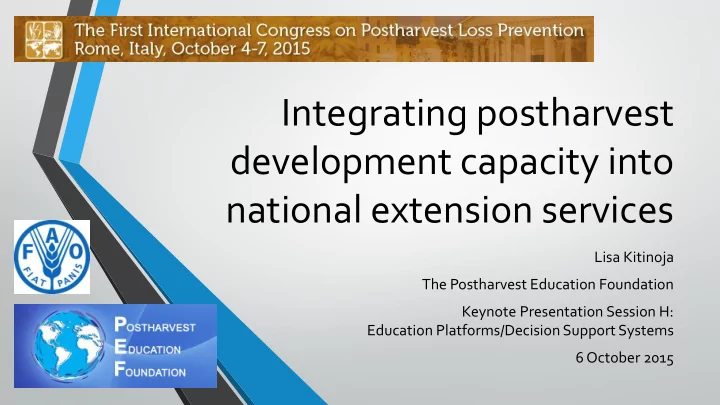

Integrating postharvest development capacity into national extension services Lisa Kitinoja The Postharvest Education Foundation Keynote Presentation Session H: Education Platforms/Decision Support Systems 6 October 2015
2014-15 UN FAO Desk Study and Policy Brief Lead author • Lisa Kitinoja Enabling efficient • The Postharvest Education Foundation national extension and • Oregon, USA advisory services for effective postharvest Co-authors • Jorge Fonseca (UN FAO AGS) technology and agro- • Alejandra Safa (UN FAO ESP) industry development • Tomoko Kato (UN FAO ESN) • Rome, Italy
Objectives of the study 1) To review and describe the current status of postharvest/agro-industry outreach, professional networks and practical training/educational programs available in the public, private and global online sectors. = an opportunity to review what our colleagues have been up to lately Just a few examples from today’s session speakers
Objectives of the study 2) To identify any gaps and 3) To provide recommendations on the size, scope and management of expanded and enhanced extension/advisory services, with guidance on the postharvest/agro-industry related skills and technical expertise and capacity building that will be needed. = an opportunity to use our imaginations and propose solutions to fill the gaps
Methods/Approach • Literature reviews /online searches (200 + references) • Surveys of key informants (33 people from 20 countries) • Case studies Ethiopia, India, Tanzania, Chile
Inclusive approach, covering: • countries where extension/advisory services have embraced the challenging issues and problems found in the postharvest/agro- industry sector as a means of promoting food security and rural development (India, Chile, Thailand, the USA and the EU countries); • countries that are newly involved in the postharvest sector (Tanzania, Ethiopia, Ghana, Sierra Leone, Nigeria, Cambodia, Indonesia); • countries showing interest in the concept but not yet making significant investments (several countries in the MENA Region, Malawi, Nepal, Rwanda).
Key informant reports • 20% of the key informants were not aware of any postharvest/agro-industry outreach or extension activities in their country • 80% were aware of specific activities, but found it difficult to estimate the number of extension/advisory service personnel who are working in these sub-fields of postharvest/agro- industry in their countries • Most national extension/advisory services are still focused on increasing production of food crops, seafood, meats and dairy products, while currently 30-50% of the foods that are being produced are lost or wasted before consumption.
Results of case studies Successes and failures help to highlight key considerations in any plans for enhanced extension/advisory services with respect to: • integrating smallholders • gender relations/role of women • nutrition There is no perfect plan that can be prescribed for universal application, but instead, we recommend a series of local postharvest loss assessments, training needs assessments and national priority setting that must be implemented in each country over a period of time.
Expanded Extension/Advisory Services Updated model of national level Research/ Extension/Clientele linkages Includes the postharvest / agro- industry sector.
A global support network A global support network has emerged in the past decade – with a vast array of informational resources, easy to access via the internet (e.g. GFRAS, eXtension, GKI, SAVE FOOD, InnovATE, IFT, NRi, PEF, TOPS, WFPC, INPhO, TECA, Practical Action, AGRA, etc). This network can provide: • Low cost program planning support • Technical training, and • Monitoring and evaluation (M&E) advice for developing more efficient national extension/advisory services.
Global model of efficient Research – Extension – Clientele linkages
How do we build postharvest capacity in developing countries? • Review current status in the country • Select one or two focus crops to begin with • Assess needs of key clientele groups via participatory appraisals along the value chain • Assess training needs of extension/advisory service personnel • Make any needed investments and upgrades, and provide training opportunities for extension staff • Plan and fund educational and outreach programs to provide extension/advisory services for clientele • Plan and conduct monitoring and evaluation
The 7 Steps Model
Future plans/ follow-up ideas • Proposals for proof of concept of the 7 Steps Model • FAO support to implement field trials in 2 or 3 countries • Integrate and promote “best practices” (technical skills, extension methods and teaching/training skills) • M&E on capacity building in postharvest/agro-industry for national extension systems and advisory services • Long-term: Establish a Global fund (with multi-billion US dollars) to support expansion into many more countries
Thank you!
For further information: • Dr. Lisa Kitinoja • Kitinoja@postharvest.org • www.postharvest.org
Recommend
More recommend